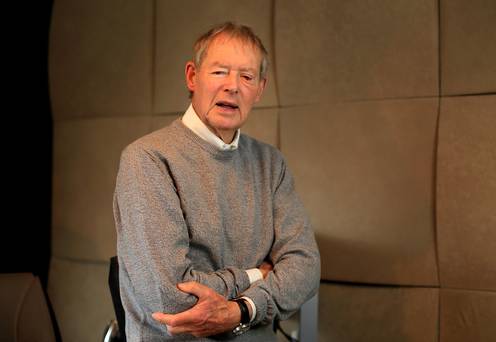As he approaches his 90th birthday, Mícheál Ó Muircheartaigh said that he has lived a “wonderful life” as he considers the legacy he would like to leave behind.
Having first donned a pair of headphones and first uttered his unmistakable commentary for RTÉ in 1949, the now 89-year-old became famous for colloquial anecdotes and turns of phrases quicker than the play he so eloquently described.
The legendary broadcaster, who was the voice of the GAA for more than 60 years, said that key to his distinguished life was an ineffable love of his job.
“In a way, I was going to broadcast, but more so I was going to see the match,” he said. “I have a great belief that you should get out of any job that you’re not happy in. I loved that job from the start to the finish.”
Please log in or register with Independent.ie for free access to this article.
Log In
New to Independent.ie? Create an account
He added: “The games keep the country going, no matter what the sport is.
“There was a time when the All-Ireland final wouldn’t get more coverage on the papers than would fit on a tissue, especially during the war. Now there’s mass coverage.
“When the All-Ireland final of 1947 was played in New York, there was only one Irish journalist at it – an All-Ireland final – and he was from the Irish Independent.”
Described upon his 2010 retirement by then-GAA president Christy Cooney as the “definitive voice of the GAA”, the Kerryman’s career was sparked after he performed a test commentary on a hurling match in Croke Park.
The only player Ó Muircheartaigh knew was the UCD goalkeeper Tadhg Hurley. After Hurley put in what Ó Muircheartaigh described as the best performance he ever saw in Croke Park, the then-teenager impressed with tales of Hurley’s brother Bob, and his sister who used to go to Dún Síon strand in the summer.
It is fitting that in the same anecdotal light his career was forged, with anecdotes like “Anthony Lynch, the Cork corner-back, will be the last person to let you down – his people are undertakers”.
The Dingle man said that these such stories came to him in the moment while enjoying watching the action he was broadcasting – the only research he did prior to his commentary was his natural obsessive fellowship of GAA at all levels.
“I wasn’t a believer in planning, and I wasn’t a believer in having too many notes at the game,” he said.
“You were there to talk about what is happening, not what you’d like to see happening or what you’ve prepared in advance. But that’s your duties. There are two sides playing, there are two sets listening – talking about what’s happening.
“And then if there’s a dull moment, you must think of something to say. Silence is the only crime on radio.”
Despite the plaudits Ó Muircheartaigh receives from the GAA world, he is humble about his own career and reluctant to take praise.
“I say Mícheál Ó hEithir was in a class of his own, and Gay Byrne was that as well. I’m not in that class,” he said.
“I knew Gay well. He was the same now as the hurler or the footballer of the year. He was a level above all else.
“He was there for a long time and it was very obvious to everyone that he loved the job and that he was interested in it. It was what he wanted to do.
“He was a great learner, he was a great listener, he had great patience, he was very intelligent, he always seemed to hit it right.”
“I never met anyone with a bad word for him. People might not like what he said because they weren’t of his view,” he continued.
“The reaction of the last few days would tell it. The man that wrote Tomás Ó Criomhthain, what turned him to do it is that he said, ‘ní bheidh a leithéid arís ann’, ‘the likes of him will never again exist’. You could say the same thing about Gay Byrne. His type of person, taken from any angle, will never be seen again.”
Now, as the former television and radio broadcaster nears his 90th birthday, he said it is time to look ahead. After pairing up with My Legacy, a group of 65 Irish charities who work together to encourage Irish people to leave money in their will, Ó Muircheartaigh said that he is considering the legacy he wants to leave.
“I have had a wonderful life, I enjoyed it. I still like looking forward to it, looking ahead,” he said. “I had always a feeling for charities and I have made a will, I think everyone should.”
“There is a saying in Irish ‘Ní neart go cur le chéile’ – you don’t really know what power is until everyone comes together, and you have people like me whose legacy will be talking to people and the word will be spread.
“I want to make things better. Like a team preparing for an All Ireland, we’re looking together in hope, and people looking forward in hope – they usually succeed.”
Source: Read Full Article
